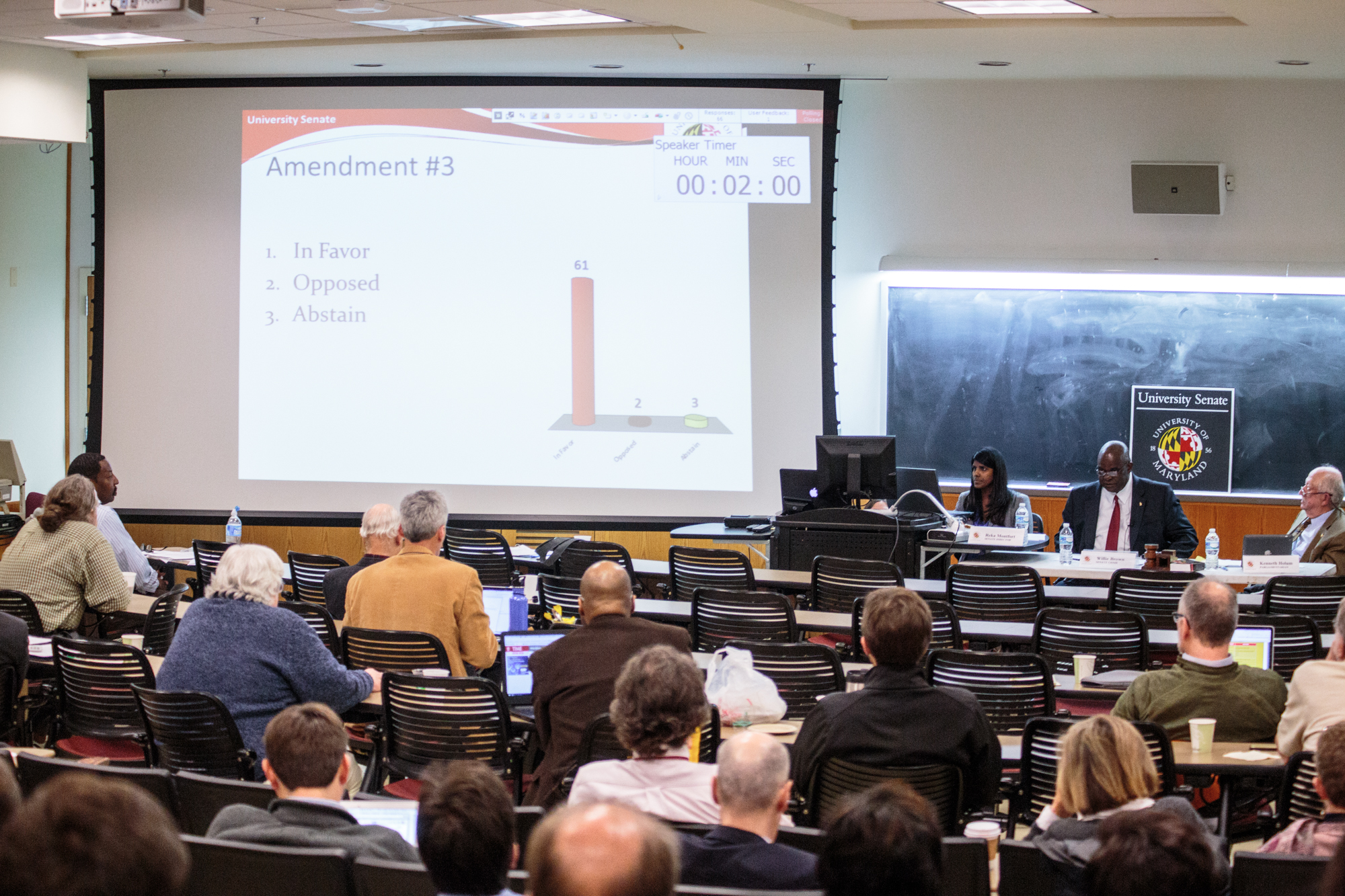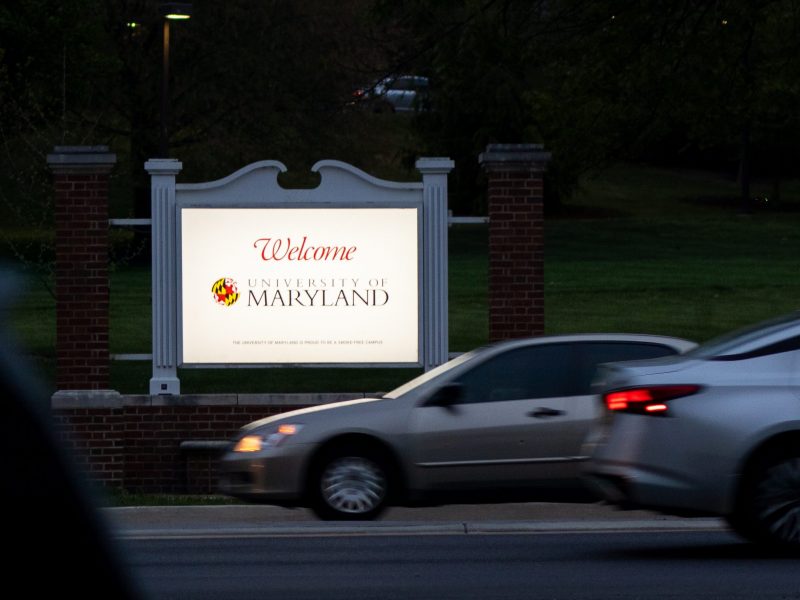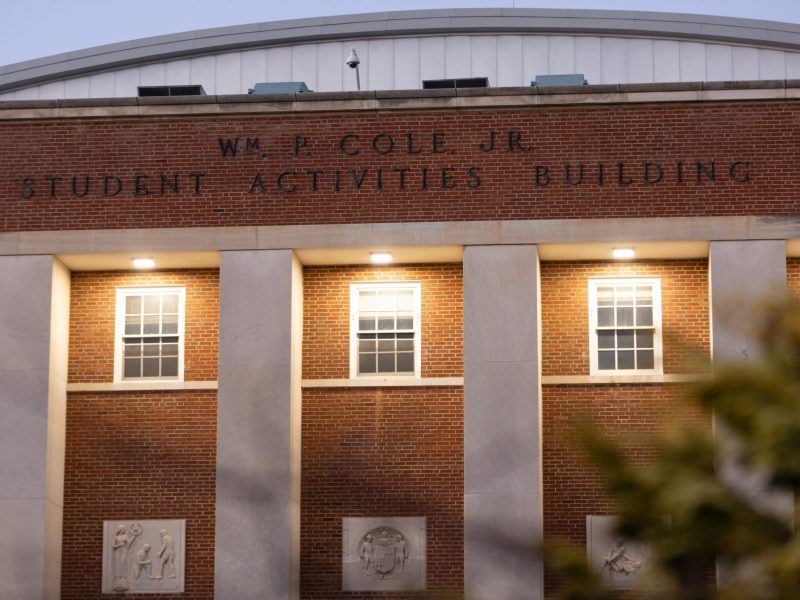The University of Maryland Senate voted to amend the campus research policy Thursday, allowing for restricted research to continue on a case-by-case basis under new guidelines.
The proposal passed 98-14 with 3 abstentions, and aims to create guidelines and procedures for anyone who wants to conduct restricted research at this university. The Senate Executive Committee voted to unanimously approve the recommended actions on Jan. 30.
Read more: University Senate vote could clarify restricted research policy, but draws concerns
Restricted refers to limiting what findings can be published. Corporations may decide to restrict their findings, or research may be classified due to national security concerns, among other reasons.
“There is already a system policy that says we don’t allow restricted research because it doesn’t allow anyone to publish their research openly, but there are in extreme cases exceptions that can be made,” University Senate Director Reka Montfort said in a January Diamondback article. “However, there is no clear guidance on that and this proposal will clarify those guidelines.”
The 20-person Research Council subcommittee that examined the proposal recommended this university continue to allow restricted research on a case-by-case basis, following the current working University System of Maryland policy from 1991, but with more specific guidelines and greater transparency in the process.
Keith Marzullo, the University Senate’s Research Council subcommittee chair, sought to change the 1991 policy and make the guidelines clearer.
“What this [existing] policy says is you can do the work, but it requests a waiver,” said Marzullo, the information studies college dean. “But what it doesn’t say is how to go about getting this waiver; who makes the decision on whether we pursue the research, what are the criteria that are used to decide whether we should, what are the safeguards and oversights?”
University President Wallace Loh must approve the changes to the policy for them to take effect. If Loh signs off on the changes, the Division of Research will adopt a checklist of terms and conditions to assist principal investigators in evaluating restricted research opportunities. The university will also implement mandatory training before a researcher can serve as the principal investigator on a restricted project, and create a quarterly report for internal use on the restricted research activity, among several other changes. The Research Council will then annually report the contents of the four quarterly reports generated over the last year.
The Research Council will also review the activity, practices, guidelines and reporting of restricted research one year after the new guidelines are implemented and every three years after that.
Criteria for promotion and tenure will not account for unpublished or otherwise undisclosed research activity.
To create these recommendations, the subcommittee met periodically throughout the fall and winter and reviewed the existing university system policy on classified and proprietary work. The group also surveyed Big Ten and peer institutions, held a campus-wide open forum Sept. 7 to solicit input from the campus community and consulted with the Office of General Counsel, according to supporting documents.
“The positive to restricted research is it gives you access to data, technology and equipment that you otherwise wouldn’t have,” Marzullo said. “The downsides are, if expert control laws are not followed, people can go to prison.
Limits on publication and questions of the motive behind projects can also be drawbacks to conducting restricted research, Marzullo added.
“Our recommendation is to have these risks mitigated by education, so laws are followed, and by having a review of what the restrictions are,” he said.
Montfort said approval for restricted research is rare and “has only happened two or three times.” But creating specific guidelines doesn’t mean restricted research on this campus will occur more often, she said, emphasizing that it will still be extremely uncommon.
Of the 14 Big Ten institutions, only Northwestern University completely denies restricted research, according to an Aug. 5 University Senate report. Marzullo noted that other Big Ten schools approve restricted research proposals “in the single digits, but the highest number having been 12 in one year.”
The University Senate also approved a proposal to create an online version of the master’s program in business analytics for the business school, updated the use of visiting faculty titles for professional track faculty appointments and endorsed the Academics Against Immigration Executive Order Petition, which has more than 42,000 signatures from academics denouncing President Trump’s 90-day ban on travel from seven predominantly Muslim countries. The ban is currently suspended as the result of a federal restraining order.



